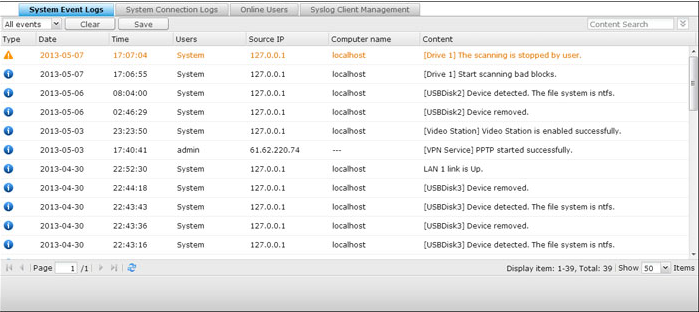Frequently Asked Question
System Setting : System Log
Last Updated 9 years ago
Go to "Control Panel" > "System Settings" > "System Logs" to configure the logs settings of your NAS.

System Event Logs
The NAS can store 10,000 recent event logs, including warning, error, and information messages. If the NAS does not function correctly, refer to the event logs for troubleshooting.
Tip: Right click a log to delete the record. To clear all logs, click "Clear All".
System Connection Logs
The NAS supports recording HTTP, FTP, Telnet, SSH, AFP, SAMBA, and iSCSI connections. Click "Options" to select the connection type to be logged. The file transfer performance can be slightly affected when this feature is turned on.
Tip: Right click a log and select to delete the record or block the IP and select how long the IP should be blocked. To clear all the logs, click "Clear All".
Start Logging: Turn on this option to archive the connection logs. The NAS generates a CSV file automatically and saves it to a specified folder when the number of logs reaches the upper limit. The file-level access logs are available on this page. The NAS will record the logs when users access, create, delete, move, or rename any files or folders via the connection type specified in "Options". To disable this feature, click "Stop logging".
Online Users
The information of the on-line users connecting to the NAS by networking services is shown on this page.
Tip: Right click a log to disconnect the IP connection and block the IP.
Syslog Client Management
Syslog is a standard for forwarding the log messages on an IP network. Turn on this option to save the event logs and connection logs to a remote Syslog server. When converting the connection logs into a CSV file, the connection type and action will be number coded. Please refer to the table below for the code meaning.
Advanced Log Search
Advanced log search is provided to search for system event logs, system connection logs and online users based on user preferences. First, specify the log type, users, computer name, date range and source IP and click "Search" to search for the desired logs or reset to list all logs. Please note that for online users, only the source IP and Computer name can be specified.
System Event Logs
The NAS can store 10,000 recent event logs, including warning, error, and information messages. If the NAS does not function correctly, refer to the event logs for troubleshooting.
Tip: Right click a log to delete the record. To clear all logs, click "Clear All".
System Connection Logs
The NAS supports recording HTTP, FTP, Telnet, SSH, AFP, SAMBA, and iSCSI connections. Click "Options" to select the connection type to be logged. The file transfer performance can be slightly affected when this feature is turned on.
Tip: Right click a log and select to delete the record or block the IP and select how long the IP should be blocked. To clear all the logs, click "Clear All".
Start Logging: Turn on this option to archive the connection logs. The NAS generates a CSV file automatically and saves it to a specified folder when the number of logs reaches the upper limit. The file-level access logs are available on this page. The NAS will record the logs when users access, create, delete, move, or rename any files or folders via the connection type specified in "Options". To disable this feature, click "Stop logging".
Online Users
The information of the on-line users connecting to the NAS by networking services is shown on this page.
Tip: Right click a log to disconnect the IP connection and block the IP.
Syslog Client Management
Syslog is a standard for forwarding the log messages on an IP network. Turn on this option to save the event logs and connection logs to a remote Syslog server. When converting the connection logs into a CSV file, the connection type and action will be number coded. Please refer to the table below for the code meaning.
| Connection type codes | Action codes |
| 0 - UNKNOWN 1 - SAMBA 2 - FTP 3 - HTTP 4 - NFS 5 - AFP 6 - TELNET 7 - SSH 8 - ISCSI | 0 - UNKNOWN 1 - DEL 2 - READ 3 - WRITE 4 - OPEN 5 - MKDIR 6 - NFSMOUNT_SUCC 7 - NFSMOUNT_FAIL 8 - RENAME 9 - LOGIN_FAIL 10 - LOGIN_SUCC 11 - LOGOUT 12 - NFSUMOUNT 13 - COPY 14 - MOVE 15 - ADD |
Advanced Log Search
Advanced log search is provided to search for system event logs, system connection logs and online users based on user preferences. First, specify the log type, users, computer name, date range and source IP and click "Search" to search for the desired logs or reset to list all logs. Please note that for online users, only the source IP and Computer name can be specified.